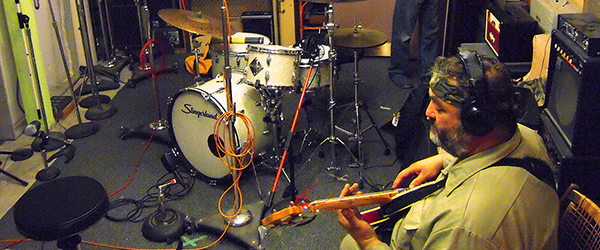But let’s say you’re an indie filmmaker with limited resources and you’re dying to use “Hotline Bling” over that super cool 2nd Act montage, but you don’t know how to begin the process of securing its use. What do you do? This was the subject of Film Independent’s Legal Ease workshop, held Tuesday, January 12 at the Film Independent offices in Los Angeles with guest speaker Mitchell Manger of the law firm Greenberg Glusker. Film Independent Associate Director of Film Education Paul Cowling moderated the discussion, which sought to shine some light into the complicated labyrinth of the music licensing process. Manger, a frequent counselor to filmmakers and production companies in matters of intellectual property, outlined several key pieces of information. Among them…
SYNC VS. MASTER AGREEMENTS There are several different types of music-licensing agreements, but the two primary ones to worry about are sync and masteruse agreements– these agreements deal with pre-existing songs and sound recordings, not ones specifically composed for your film. Sync refers to the actual composition/song—melody, lyrics and arrangement – as synchronized in timed relation with a motion picture. In almost all cases, a sync agreement is required in order to use a song in a film. Masteruse refers to the use of a specific (master) recording (whether live or in-studio) of the song, either the original artist recording or cover version, in timed relation with a motion picture. Cowling laid out the example of U2’s cover of “Helter Skelter.” A filmmaker wishing to use this specific recording of the song will need first to seek a sync agreement from the copyright holder to the original Beatles composition in addition to a master recording agreement from U2’s record label. If, however, the filmmaker wanted to use the Fab Four’s original, rights to both sync and master recording would be sought from the Beatles’ publishing company. Sounds simple enough, right? Not so fast—composition rights and recording masters can often fall into unexpected hands, requiring extensive detective work to determine who owns which part of what version of each song, proving that music supervisors are nothing if not the Sherlock Holmes of the film world.
CLASSICAL MUSIC IS NOT FREE Let’s say you want to pull a 2001 Kubrick and score your film with wall-to-wall classical music. You’re in the clear, right? Beethoven and Brahms are centuries dead and their music is in the public domain. After all, it’s not like Amadeus is going to sue you. Again, the issue of sync vs. master use rears its ugly head. While a piece of classical music may have unrestricted compositional application, the specific performance of a piece of classical music is, in fact, copyrightable. That means that while the music from “Don Giovanni” may be free to use in theory, the New York Metropolitan Opera’s recording of it is not. You need to seek permission from the original recording’s copyright holder. You may be thinking, “but doesn’t every version of ‘Swan Lake’ sound the same? Who’s going to know?” Trust us—musicians know. And more importantly, their lawyers know.
PAYING MUSICIANS AND COMPOSERS ON A “STEP” SYSTEM Let’s face it: if you’re an independent filmmaker chances are you don’t have the budget to pay for both a sync and performance rights outright for wide-scale commercial distribution. If that’s the case, you might want to consider a “step” system of payment, which structures incremental payments around specific milestones in the life of film. It sounds complicated, but let’s say you have an awesome documentary about the history of the Jersey Shore boardwalk. Bruce Springsteen has seen an early cut of the film and he loves it. He’s even agreed to write an original song for you(and his publisher and record label both agreed to waive his exclusivity to them). Great! Since Bruce is the coolest, he agrees for you to pay him a small amount of money in exchange for a demo. This is the first step. You of course love the song, so you move on to the next step, paying Bruce a second fee amount to record a studio version of the track with the understanding that it will, in fact, be included on the film’s soundtrack.This lump-sum “recording fund” covers both the creative fee for writing the composition and the fee for being the recording artist. And because of his clout as “The Boss”, he might ask for half or all of the publishing (i.e. the rights in the song, subject to your right to “sync” it with your film). Your film—let’s call it Shore Thing—gets into the LA Film Festival. Good for you! This means you’ve moved to yet another step. Get ready to write a check to Bruce for the right to use his song in conjunction with festival exhibition. Harvey Weinstein sees Shore Thing and decides he wants The Weinstein Company to distribute it. That’s pretty cool, but now you (likely with Harvey’s help) need to pony up yet another fee for widespread commercial distribution. And so on and so on, all the way through DVD and digital release. This may sound like a lot of money, but paying on a step system allows independent creators to avoid paying massive up-front fees for blanket usage fees.
BEWARE FAVORS FROM YOUR ROCK STAR FRIENDS Recording contracts are complicated, restrictive documents that musicians may not always fully understand, which is why it’s always beneficial to enlist the help of a lawyer to help navigate them. One example at Tuesday’s event was a messy story about a rock star friend who had agreed to write some original music for a friend’s film. The rock star was signed to a major label as part of a band, but assumed that any work he did outside of his group was free from the restrictions of the band’s recording contract. That wasn’t the case, as the filmmaker soon found out. Typical recording contracts usually tie up any and all of the artist’s work, regardless of the nature of its creation or intended use. So the next time your pal Pat Smear offers to lay down some tasty guitar loops for your opening credits sequence, watch out. Legally speaking, those loops are likely to fall under the Foo Fighters family of products, property of Capitol records. These are only a few of the topics discussed, as the subject of music licensing proved an incredibly rich, complicated subject, full of vagaries and unique situations that require individual case-by-case appraisal. But when in doubt, the best bet is to consult a lawyer. That way you can get the music you want while steering clear of the courtroom. For more information about upcoming Film Independent events, click here. To learn more about our Film Education program, click here. Learn how to become a Member of Film Independent by visiting our website and subscribe to our YouTube channel. Matt Warren / Film Independent Digital Content Manager



